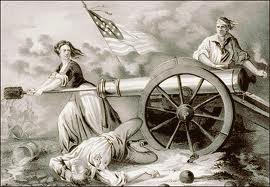Jul.05.2011
1:27 am
by Ed Beakley
Independance Day 2011, Standing on Third, who hit the triple?
Boundary Condition #3 (3)
The Project White Horse 084640 post for Fourth of July 2010 noted that we celebrate our country’s birthday in the warmth of summer recalling the day we declared our right as free and independent states, the day the signers pledged their lives, fortune and sacred honor, but that we would do well to also recall a bitter cold Christmas night, a general and an army that made it so.
“And for the support of this Declaration, with a firm reliance on the protection of Divine Providence, we mutually pledge to each other our Lives, our Fortunes, and our sacred Honour” offered a narrative connection of the 4 July adoption of the Declaration of Independence with the Christmas morning Battle of Trenton as possibly representing the singularly most significant or compelling event in our country’s history to this day. Without Trenton there would have been no “Spirit of 76″ out of the 4th of July.
Molly Pitcher at the Battle of Monmouth
And yet beyond Trenton, Princeton, and the Petite Guerre of winter 1777, Washington and the Continental Army again found themselves in dire straits through the next winter at Valley Forge. It was not until the little discussed Battle of Monmouth 28 June 1778, that Washington’s perseverance and leadership and commitment to the training for European style battle gained at Valley Forge began to indicate the real possibility that the aims of the Declaration could actually be gained.
We celebrate a day, but our independence is a narrative that ebbs and flows. It cannot be understood or grasped from one event or the decisions around that occurrence. It is easy and understandable to find ourselves in the great American game of baseball, high fiving the coach at third base, losing site of the fact that we didn’t hit the triple that got us there, nor is there guarantee the next batter will bring us home. We won the lottery of birth but what do we owe and what must we continue to do in recognition of our luck?
The fourth part of DaVinci’s Horse posted in Spring 2008 sixth PWH edition concluded with a point out of East of Eden (1952) by John Steinbeck which tells the stories of three generations of two families, focusing on the theme of good against evil and making prominent use of the biblical story of Cain and Abel. Cain murders his brother out of jealousy after God rejects his gift but then accepts Abel’s. In the novel, Steinbeck ascribes great significance to the translation of the Hebrew word timshel (“thou mayest” or “thou will”) overcome sin or evil. He believes it demonstrates that humans have free will and can triumph over sin if they choose to do so, but victory is not guaranteed.
Continuing, the George W. Cecil quote was offered:
On the Plains of Hesitation, bleach the bones of countless millions who, at the Dawn of Victory, sat down to wait, and waiting died.
Said then and again now on 4 July 2011, I submit to you that those frontiersmen who defied Great Britain at risk of everything dear in fathering this nation, recognized full well that they were not guaranteeing anything, knew that what they had crafted was inherently flawed, and realized that what they had accomplished was to place a new nation at the dawn of victory – not for a year or a decade or a century but for as long as the people of the nation could reproduce the resiliency – spirit, blood, and treasure – of 1776.
Thou mayest.
The story must continue.
(Wonder how Molly celebrated the Fourth of July 1778?)
Filed in War and Remembrance | Comments Off

